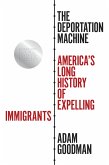"This book is a history of a century of migrant detention, showing how immigration bureaucracy and the criminal justice system gave rise to this peculiar form of imprisonment in the United States. Historian Brianna Nofil tracks the political evolution of immigration policy but also follows the money, uncovering the network of individuals, municipalities, and private corporations that profited from immigrant detention. From the incarceration of Chinese migrants in the furthest reaches of New York at the turn of the twentieth century to the jailing of Caribbean asylum seekers in Gulf South lockups in the 1980s and 90s, Detention Power uncovers how the criminal justice system and immigration law enforcement have long collaborated, shared resources, and pursued a common project of incarceration and racial control. As Nofil shows, sheriffs and city commissions throughout the U.S. capitalized on contracts with the immigration service by expanding their jails and, in some cases, building separate "migrant jails" to secure federal detainees, effectively transforming incarcerated migrants into local commodities. Nofil's archives include records of district courts, presidential administrations, the immigration service, and legal aid groups, as well as overlooked local sources from communities at the heart of the detention business. At stake is the history of how immigrants who have been unwanted as citizens and workers were nevertheless coveted for their value in a "detention market" that brought federal money to local communities. Nofil is attentive to the backlash this form of imprisonment sparked even as she shows the longstanding role of immigration policing in the building of our mass incarceration society"--
Hinweis: Dieser Artikel kann nur an eine deutsche Lieferadresse ausgeliefert werden.
Hinweis: Dieser Artikel kann nur an eine deutsche Lieferadresse ausgeliefert werden.








